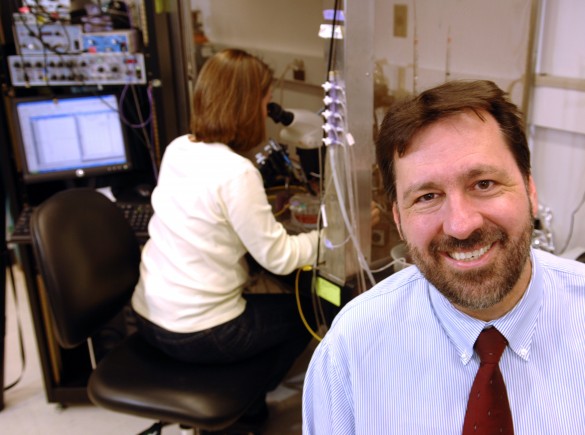Medical researchers at Vanderbilt’s Jeffery Conn’s Research Group have discovered a new way to reduce the effects of schizophrenia in mice. The medical breakthrough could have a life-changing impact for the three million people in the United States suffering from schizophrenia.
Conn, a Vanderbilt and Yale University graduate, became interested in developing medications to treat psychiatric disorders such as schizophrenia after joining the faculty at Emory University. At Emory, Conn began work to develop new therapeutic approaches to treating schizophrenia. After 12 years at Emory, Conn moved to work at Merck Pharmaceutical company, where he continued to research how schizophrenia operates in the brain.
“At Merck, we started the work to get this program off the ground,” Conn said. “Then I realized that it’s hard to take new approaches in a pharmaceutical setting. Often you are making incremental advances in the existing approaches. This was fundamentally new approach.”
Eventually, Conn decided to move back into academia, and that is when he decided to move to Vanderbilt. Once he arrived on campus, he started the Neuroscience Drug Discovery Center to continue his research. For Conn, the recent advances in discovering a way to limit the effects of schizophrenia, while limiting the adverse side effects of medication, is the culmination of almost two decades of work.
“The project has its origins going all the way back to Emory, so it’s been about 17 years since I started the work,” Conn said.
Conn explained that the new findings have their roots in the 1990s with a study by Eli Lily to develop new medicines to treat Alzheimer’s disease. However, the new medicines caused intolerable side effects and did not improve mental cognition. However, Lily found that the drugs improved psychosis by reducing hallucinations and delusions. The findings inspired Conn and his colleagues to build on the successes of the Alzheimer drugs in improving cognition while also limiting the severe adverse side effects.
Current antipsychotic medications work by blocking receptors in the brain for dopamine. Blocking the receptors for dopamine reduces hallucinations, delusions and other psychotic symptoms, but it also leads to a loss of cognitive function. The new approach to treating schizophrenia works by preventing the release of dopamine in areas that cause psychosis, which reduces psychosis while not inhibiting cognition.
Conn is optimistic that the new medications will have a noticeable impact on people in the near future, but explained that many steps remain before the drug could be used by people suffering from schizophrenia. The various phases of the process include toxicity studies, symptomatic tests and multinational patient trials.
“Best case scenario, we are seven or eight years before we can launch the new medicine and doctors can prescribe it,” said Conn.
Conn stressed caution in detailing the potential impact of the drug for schizophrenia patients, explaining that more studies are necessary to know the exact effects of the drugs. However, he pointed to the previous studies to explain that the new medicine could rapidly reverse psychosis. He also speculated that the new drugs could have the ability to reduce psychotic episodes within the first week of treatment, instead of the seven to eight weeks that current drugs take to have an effect on schizophrenia symptoms.
Conn also believes the new drugs can improve cognitive functions and potentially have an impact on the thirty percent of schizophrenia patients that do not respond to current drugs.
If everything goes as planned, Conn expects the new treatments to be the most significant advancement in schizophrenia treatment in fifty years.
“This could be potentially life changing.,” Conn said. “It would be the first major paradigm shift. The first fundamentally new strategy since the first antipsychotics was discovered in the 1960s.”

